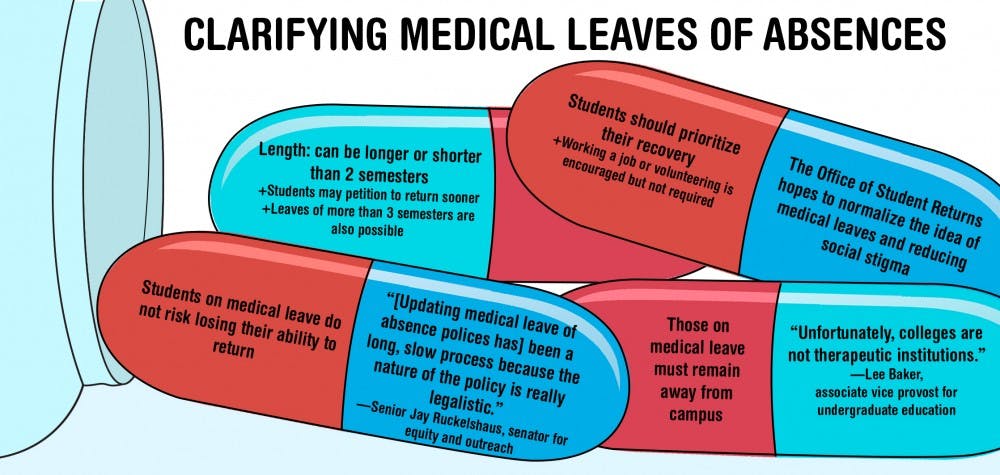Duke Student Government and University administrators hope that students will have an easier time navigating the medical leave process after clarifications to the University’s leave policy.
Updates being made to the policy include provisions clarifying the length of medical leaves as well as the conditions imposed on students who decide to take a medical leave. In particular, the policy now states explicitly that medical leaves can be longer or shorter than two semesters, whereas in the past the policy stated that they had to be at least two semesters. Students on medical leave will still be required to remain away from campus for the duration of their leave. The policy changes were prompted by efforts from DSG to reduce confusing elements in the current medical leave procedures.
“It didn’t make sense to have this one blanket policy and force all students to wait a whole year [to return from medical leave],” said senior Jay Ruckelshaus, senator for equity and outreach, noting that some students are ready to return quickly after a relatively minor illness. “I envision this being used a lot more now that this actually says so in the text.”
Some of the changes to the policy codify what has already been University practice. Currently, students on medical leave are expected to stay on leave for two terms beyond the term they left. These additional terms of leave can include a full summer. Although students have been able to petition to return to Duke sooner in the past, the new changes will formalize this process and make it clear that returning after one semester is a possibility. The possibility of extended medical leaves lasting three semesters or more will be added to the policy as well, though it has already been offered by the school.
One aspect of the policy that has not changed is the requirement that students on leave remain away from campus or risk losing their ability to return.
Lee Baker, associate vice provost for undergraduate education and dean of academic affairs, said students are best able to improve their health away from campus, especially as many of the problems prompting medical leaves arise from being on campus.
“Unfortunately, colleges are not therapeutic institutions,” he noted.
The revised policy also clarifies that students are not required to work a job or volunteer while they are away as is the case with other types of leaves of absence, including those for personal or disciplinary reasons. Although there is the expectation that students do something productive while away, they will primarily be tasked with getting better and can figure out a plan for their leave on a case-by-case basis, Ruckelshaus explained.
Administrators said that engaging in some activity while on leave helps students remain productive during their time out of school.
“We want them connected and integrated in a particular community because that’s how people grow and develop and become healthy,” Baker said. “We want them engaged—whether that’s work, school or volunteer work. It’s not a punishment.”
Ruckelshaus said he has been advocating for a change to the policy since Fall 2012 after going on medical leave himself before his freshman year. He, junior Ilana Weisman, vice president for equity and outreach, and DSG President Keizra Mecklai, a senior, worked with Baker and Dean Sabrina Thomas, who oversees the Office of Student Returns. Mecklai spotlighted medical leaves as an issue in her campaign platform last year.
“Medical leave of absence policies haven’t been updated in years,” Ruckelshaus noted. “It’s been a long, slow process because the nature of the policy is really legalistic.”
According to numbers provided by Baker, roughly one third of leaves taken by students are medical leaves.
Change to the policy in the past has been tempered by administrative worries that overly permissive standards for returning to school could lead to students going on leave multiple times.
“A lot of the other schools that have more relaxed policies don’t have the same graduation rate [as Duke],” Baker noted. “We want students to be successful. We want our students to finish strong.”
Overall, Ruckelshaus is excited by the changes that present a friendlier face to the often daunting process through more accessible language and greater support for programs serving students who have gone on or are considering going on leave.
The Office of Student Returns also hopes to address the stigma surrounding students who take leaves of absence. The OSR student ambassador program has existed for several years and serves students regardless of the type of leave they take.
Junior Simirpreet Gill, who is serving as an OSR Ambassador this year, said the program will be more outward-facing as it seeks to plan programming to get students to normalize the idea of going on leave.
“Don’t feel like you can’t [take a leave] or that you can’t talk to anyone about it,” Gill, who took a leave during her freshman year, said. “The ultimate goal would be to normalize it and reduce the stigma surrounding it so other students can get help.”
After going on leave, students can participate in the program’s activities, including regular luncheons and personal narrative oral history projects. Gill said she has made new friends based on shared experiences through the support group.
“It’s really just a super program,” Gill said. “[Students in the program] get me in ways that others might not.”
The official policy changes will be included in the 2016-2017 Undergraduate Bulletin but will be applied immediately by academic deans and the committees that review applications for return, Thomas noted in an email.
Get The Chronicle straight to your inbox
Signup for our weekly newsletter. Cancel at any time.
Adam Beyer is a senior public policy major and is The Chronicle's Digital Strategy Team director.

